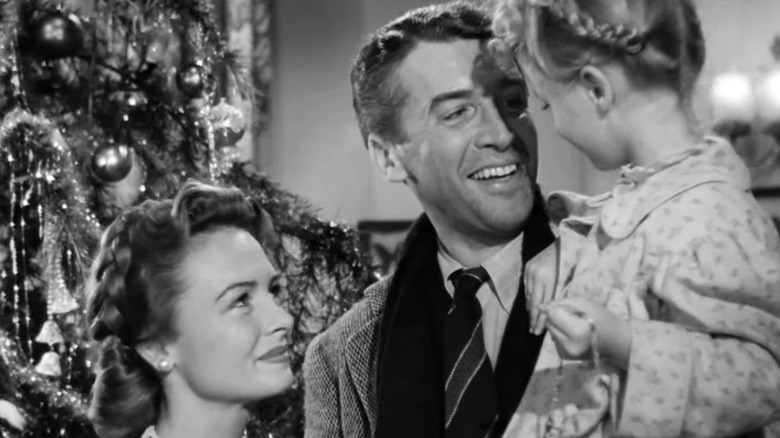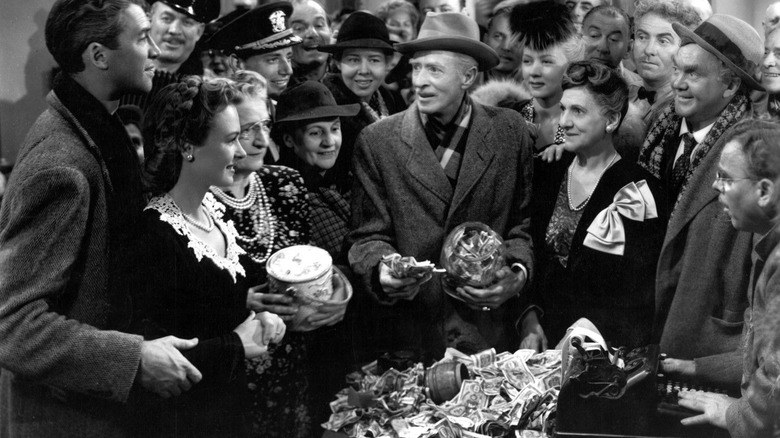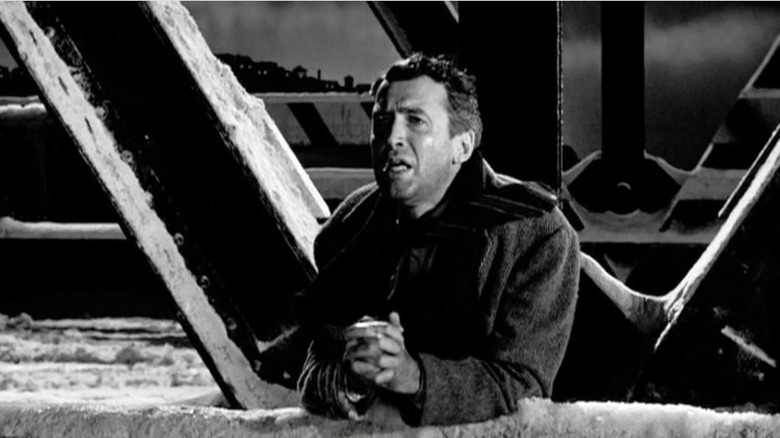A Christmas Card Did More For It's A Wonderful Life Than Three Legendary Hollywood Writers
We may receive a commission on purchases made from links.
Had author Philip Van Doren Stern not self-published his short story, "The Greatest Gift," and sent it out to his friends and family as his Christmas card, we may never have got "It's a Wonderful Life." The irony is not lost considering the story's plot.
The author spent months trying to hunt down a publisher willing to take a chance on his story about a man encountering a guardian angel that shows him what the world would have been like if he'd never been born. That's when he took the route to publish 200 copies of the story to send out to his loved ones.
His daughter Marguerite Stern Robinson recalled (via Independent) being in the third grade and delivering a few of the cards off to her teachers and friends. Back then, her father explained to her the importance of the story: "My father, who was himself from a mixed religious background, explained to me that while this story takes place at Christmas time, and that we were sending it as a Christmas card to our friends, it is a universal story for all people in all times."
Eventually, one of the cards would find its way to RKO Pictures and it caught their attention. After purchasing the rights, the studio immediately set out to get a script written asap. Screenwriters Dalton Trumbo, Clifford Odets, and Marc Connelly took a swing at it, but all struggled to nail down what made Stern's story so compelling.
From family man to politician
There's not much information about the specifics of Odets's and Connelly's scripts. However, Trumbo's interpretation of the story failed to hit the mark. If the name Trumbo doesn't sound familiar, he was the screenwriter for "Roman Holiday," "Spartacus," and "Johnny Got His Gun" to name a few.
As John A. Noakes covered in his work, Trumbo's script reimagined the character George Bailey as a politician who gradually slides into cynicism as the story comes along. He contemplates suicide after losing an election, and is stopped by a guardian angel. Departing further from Stern's story, the guardian angel shows the politically-minded Bailey what would have happened if he didn't choose a life of politics.
The original universal nature of Stern's original story got lost in translation in favor of a more blatant subversive interpretation by Trumbo. RKO Pictures, not picking up what Trumbo was putting down, pivoted to another potential candidate for the film: Frank Capra. Capra reflected in a discussion with American Film Institute on how he got involved:
"A man from RKO, he came in and he says, 'I got the story for you!' Well, boy, that happened 100 times a day. 'I've got just the story! We've got three scripts on it. One scripted by Marc Connelly, one by Dalton Trumbo, one by Cliff Odets.' Three powerhouse guys had written scripts on this thing. They'd missed the idea! I said, 'What idea?' He said, 'The idea I got when I bought this Christmas card.'"
The Christmas card in question? The same one Sterns had sent out to his loved ones.
Back to the source
Remember when I said that RKO Pictures had one of the original cards, technically pamphlets, that Sterns had sent out with his story? The studio held onto it while workshopping different scripts, and it was this story printed on the card that the rep from RKO brought to Capra. Capra recalled the lightbulb moment he had after reading through the story written on the card, and its impact:
"In about nine paragraphs, there was this story. A man who was a failure, who was given the opportunity to come back and see the world as it would have been had he not been born, and he finds out, no man is a failure. Well my goodness, this thing hit me like a ton of brick. So I wrote my own script, and that's the story of 'Wonderful Life.'"
It can be easy to lose the plot or key themes that need to be addressed in the process of adapting someone else's work. Trumbo, in particular, seemed to lose that in his own version. Capra, in seeing the card with fresh eyes without distraction, could easily see what he had missed initially. He, of course, required a bit more help to get his own version, renamed "It's a Wonderful Life," together and brought on writers Frances Goodrich, Albert Hackett, Jo Swerling, and Michael Wilson at various points in the process.
While it took a team of writers to successfully adapt Sterns' story into the holiday film classic we all know and love, the match that lit the spark was the Christmas card pamphlet the author sent out when no publisher would take a chance on him.


